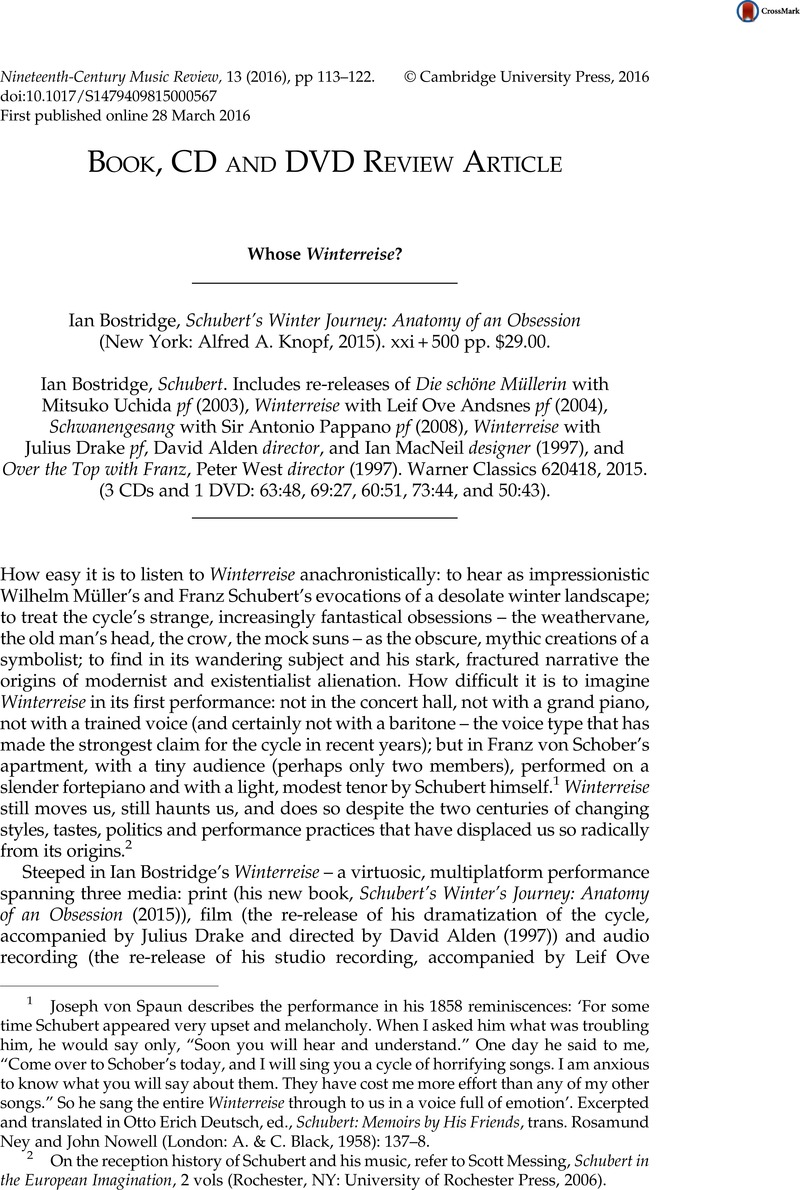No CrossRef data available.
Published online by Cambridge University Press: 28 March 2016

1 Joseph von Spaun describes the performance in his 1858 reminiscences: ‘For some time Schubert appeared very upset and melancholy. When I asked him what was troubling him, he would say only, “Soon you will hear and understand.” One day he said to me, “Come over to Schober’s today, and I will sing you a cycle of horrifying songs. I am anxious to know what you will say about them. They have cost me more effort than any of my other songs.” So he sang the entire Winterreise through to us in a voice full of emotion. Excerpted and translated in Otto Erich Deutsch, ed., Schubert: Memoirs by His Friends, trans. Rosamund Ney and John Nowell (London: A. & C. Black, 1958): 137–8.
2 On the reception history of Schubert and his music, refer to Messing, Scott, Schubert in the European Imagination, 2 vols (Rochester, NY: University of Rochester Press, 2006)Google Scholar.
3 Warner Classics’s re-release also includes recordings of Die schöne Müllerin with Mitsuko Uchida and Schwanengesang with Sir Antonio Pappano.
4 Youens, Susan, Retracing a Winter’s Journey: Franz Schubert’s ‘Winterreise’ (Ithaca, NY and London: Cornell University Press, 1991)Google Scholar; Schubert, Franz, Winterreise: The Autograph Score, with an introduction by Susan Youens (New York: Pierpont Morgan Library in association with Dover Publications, 1989)Google Scholar; and Suurpää, Lauri, Death in ‘Winterreise’: Musico-Poetic Association in Schubert’s Song Cycle (Bloomington: Indiana University Press, 2014)Google Scholar. A new facsimile edition with commentary by Michael Kube has been published in the series Meisterwerke der Musik im Faksimile (Laaber: Laaber-Verlag, 2015).
5 Craig, Gordon A., The Germans (New York: Putnam, 1982; rpt. Meridian, 1991): 190–212 Google Scholar.
6 Audio examples are available at the Nineteenth-Century Music Review’s website, http://journals.cambridge.org/action/displayJournal?jid=NCM.
7 Bostridge, Ian, A Singer’s Notebook (London: Faber and Faber, 2011)Google Scholar.
8 For more, refer to Montgomery, David, Franz Schubert’s Music in Performance: Compositional Ideals, Notational Intent, Historical Realities, Pedagogical Foundations (Hillsdale, NY: Pendragon Press, 2003): 23 Google Scholar.
9 On this topic, refer to Gramit, David, Cultivating Music: The Aspirations, Interests, and Limits of German Musical Culture, 1770–1848 (Berkeley, Los Angeles and London: University of California Press, 2002): 67 Google Scholar.